Men with Oily Skin
For many men, oily skin can feel like a constant battle; a relentless shine that appears only hours after cleansing, stubborn acne that refuses to disappear, and the greasy texture that undermines even the best grooming routines.
While everyone’s skin produces natural oils, some men have sebaceous glands that are far more active, leading to what’s known as oily skin. Understanding why this happens, what makes it worse, and how to properly care for it can transform skin from greasy to glowing without compromising its natural balance.
Understanding Oily Skin
Oily skin is characterized by an overproduction of sebum, the skin’s natural oil secreted by the sebaceous glands. Sebum isn’t inherently bad; in fact, it’s essential for keeping the skin moisturized and protected.
However, when the body produces too much of it, pores can become clogged, leading to blackheads, whiteheads, and acne.
Why Men Are More Prone to Oily Skin?

Men, in general, are more likely to experience oily skin than women, largely due to hormonal and physiological differences. The male hormone testosterone directly influences sebum production. Higher testosterone levels mean larger and more active sebaceous glands, which results in an oilier skin surface.
Additionally, men’s skin is approximately 25% thicker than women’s, and it contains more collagen and larger pores. While this gives men certain advantages in terms of aging (fewer wrinkles, for example), it also makes them more susceptible to excess oil buildup and clogged pores.
Common Characteristics of Oily Skin in Men
Men with oily skin often display several distinct traits that set their skin type apart. These features are not only visible but also affect how the skin feels and behaves throughout the day.
1. Persistent Shine
The most noticeable sign of oily skin is a constant, reflective shine; especially across the T zone (forehead, nose, and chin). Even after cleansing, this glossy appearance often returns within a few hours. This happens because overactive sebaceous glands continually produce excess sebum, coating the skin’s surface. Warm weather, stress, and physical activity can make the shine even more prominent.
2. Enlarged Pores
Men with oily skin usually have larger, more visible pores, particularly around the nose and cheeks. Since the sebaceous glands produce more oil, the pores stretch to release it. Over time, these enlarged pores can trap dirt, oil, and bacteria, leading to blackheads and rough skin texture. Though pore size cannot be completely reduced, regular cleansing and exfoliation can help keep them clear and less noticeable.
3. Frequent Breakouts
Excess oil often mixes with dead skin cells, clogging pores and encouraging bacterial growth. This leads to blackheads, whiteheads, and acne breakouts, not just on the face but also on the back and shoulders. These blemishes are common among men with oily skin, particularly during periods of stress, hormonal fluctuation, or heat.
4. Greasy or Slick Texture
Touching the skin often reveals a greasy or slippery feel, which can make it difficult for skincare products to absorb properly. The slick texture may reappear shortly after washing, leaving the face feeling unclean even when freshly washed. Men may notice that oil accumulates more during the day, especially in humid environments or after physical exertion.
5. Dull or Uneven Skin Tone
Despite its shine, oily skin can appear dull or uneven. This happens when excess oil traps dirt and dead skin cells, creating a film that blocks natural radiance. Over time, this can lead to rough patches, uneven pigmentation, and a tired look. Regular exfoliation and proper hydration are key to restoring balance and clarity.
Factors That Trigger or Worsen Oily Skin
1. Hormonal Activity
As mentioned, testosterone plays a major role. During puberty, hormone levels spike, triggering an increase in oil production which is why teenage boys often suffer from acne. Even in adulthood, stress, diet, and certain health conditions can affect hormonal balance, leading to fluctuations in oiliness.
2. Climate and Environment
Hot, humid weather stimulates the sebaceous glands, making the skin oilier. Men who live in tropical or humid environments tend to experience greasier skin, particularly in summer months.
3. Improper Skincare Routine
Over washing the face or using harsh, alcoholbased cleansers can strip the skin of its natural oils. In response, the skin compensates by producing even more oil, worsening the problem.
4. Diet and Lifestyle
A diet high in refined sugars, fried foods, and dairy has been linked to increased sebum production and inflammation. Similarly, stress and lack of sleep can trigger hormonal imbalances that exacerbate oiliness and acne.
5. Genetics
Oily skin often runs in families. If your father or brothers struggle with oily skin, chances are, you will too.
Right Skincare Routine for Men with Oily Skin
An effective skincare routine can help control oil production, prevent acne, and improve the overall health and appearance of the skin. Consistency is key.
1. Cleansing
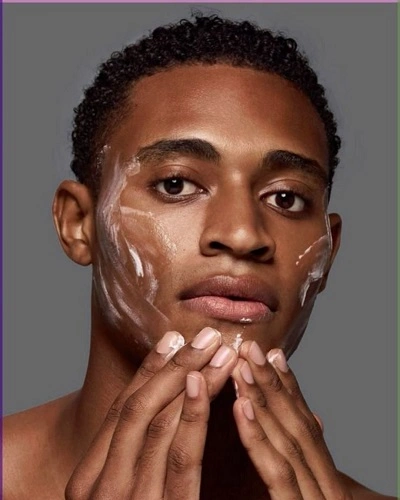
Use a gentle, foaming cleanser designed for oily or combination skin. Look for ingredients like salicylic acid, glycolic acid, or tea tree oil, which help dissolve excess oil and unclog pores. Cleansing twice a day; morning and night is essential. Avoid bar soaps or overly harsh cleansers that can strip the skin.
2. Exfoliation
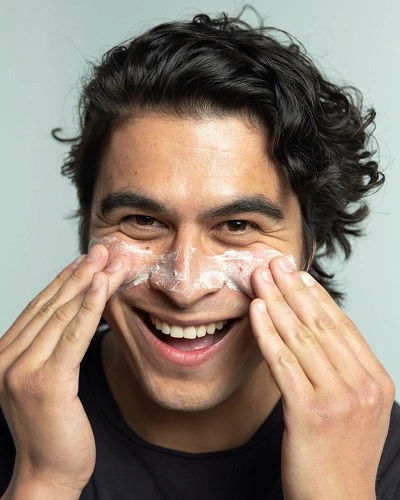
Exfoliating 2–3 times a week helps remove dead skin cells that mix with oil and clog pores. Choose a chemical exfoliant with BHA (beta hydroxy acid), such as salicylic acid, rather than abrasive scrubs, which can irritate and damage the skin.
3. Toning

A toner helps to balance the skin’s pH, tighten pores, and remove leftover residue. Opt for an alcohol free toner infused with ingredients like witch hazel, niacinamide, or green tea extract.
4. Moisturizing
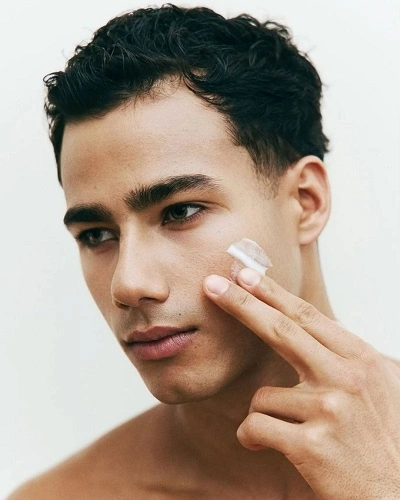
Even oily skin needs moisture. Skipping moisturizer is a common mistake when the skin becomes dehydrated, it produces even more oil to compensate. Use a lightweight, oil free, non comedogenic moisturizer that hydrates without adding grease.
5. Sun Protection
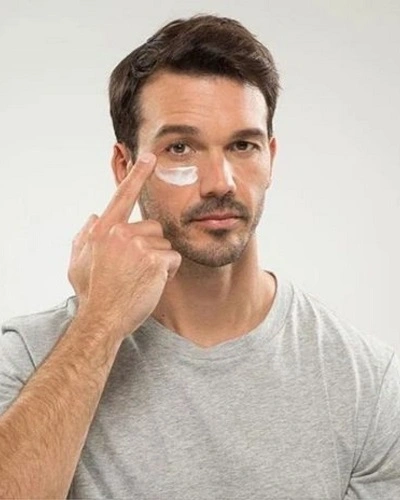
Oily skin doesn’t make you immune to UV damage. Use a matte finish, broad spectrum sunscreen (SPF 30 or higher) daily. Gel based or mineral sunscreens are excellent for oily skin because they don’t leave a heavy or shiny residue.
Additional Tips for Managing Oily Skin
Beyond a regular skincare routine, a few smart habits can help men control excess oil, prevent breakouts, and maintain a fresher complexion throughout the day.
1. Blotting Papers
Blotting papers are a quick and convenient fix for mid day shine. These thin sheets gently absorb excess oil without disturbing your skin’s moisture or removing products like sunscreen. Simply press; not rub, the paper on oily areas such as the forehead, nose, and chin to instantly refresh your skin and reduce greasiness.
2. Avoid Touching Your Face

Your hands collect dirt, oils, and bacteria all day, which can easily transfer to your skin and clog pores. Avoid resting your face on your hands or constantly touching your cheeks and chin. This small change helps prevent breakouts and irritation.
3. Stay Hydrated

Drinking enough water keeps your skin’s oil production balanced. When skin becomes dehydrated, it compensates by producing even more sebum. Aim to drink plenty of water daily and include hydrating foods like fruits and vegetables in your diet to maintain skin health from the inside out.
4. Use Clay or Charcoal Masks
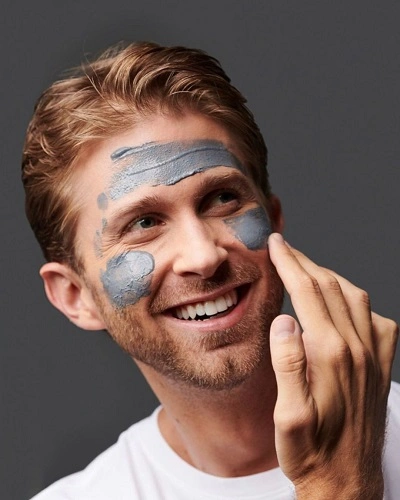
Applying a clay or charcoal mask once or twice a week helps draw out impurities, dirt, and excess oil from deep within the pores. Clay masks with bentonite or kaolin are especially effective, leaving the skin clean, smooth, and refreshed without drying it out.
5. Maintain a Balanced Diet

A healthy diet can significantly improve oily skin. Include foods rich in omega 3 fatty acids, antioxidants, and vitamins A, C, and E, which help regulate oil production and support overall skin repair. Reduce processed foods, sugar, and greasy meals, as these can trigger inflammation and excess sebum.
Common Mistakes Men Make with Oily Skin
Managing oily skin takes more than just washing your face; it requires understanding what helps and what harms. Many men unknowingly make small skincare errors that worsen shine and trigger more oil production. Here are some of the most common mistakes to avoid.
1. Over cleansing

Washing your face too often might seem like the right way to remove oil, but it actually does the opposite. Over cleansing strips away natural oils, leaving your skin dry and prompting the sebaceous glands to produce even more sebum. Stick to cleansing twice a day with a gentle, oil free face wash to keep your skin balanced and refreshed.
2. Skipping Moisturizer
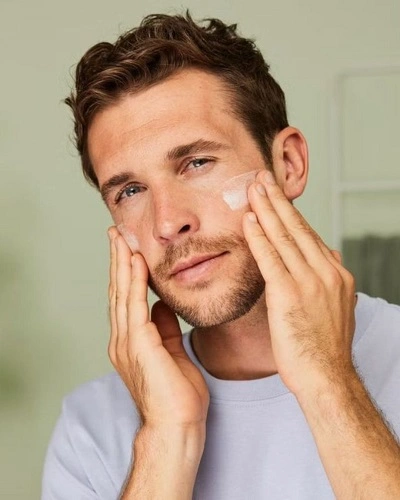
A lot of men think oily skin doesn’t need moisturizer, but that’s a myth. Skipping moisturizer causes dehydration, which leads the skin to compensate by producing excess oil. Instead, use a lightweight, gel based, or oil free moisturizer that keeps the skin hydrated without feeling greasy.
3. Using the Wrong Products
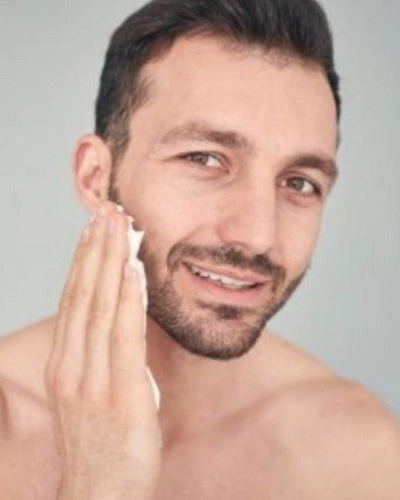
Heavy creams, oil based lotions, and thick sunscreens can clog pores and trap sebum, making breakouts worse. On the other hand, harsh soaps and alcohol based products dry the skin excessively. Always choose non comedogenic, matte finish, and water based products that help control shine without irritation.
4. Not Changing Pillowcases or Towels Frequently

Pillowcases and towels can collect oil, sweat, and bacteria, which transfer back to your skin each time you use them. This leads to clogged pores and acne. Make sure to wash pillowcases twice a week and always use a clean towel for your face to maintain hygiene and prevent breakouts.
5. Ignoring the Role of Diet

Your diet affects your skin more than you might think. Eating too much sugar, fried food, or dairy can increase oil production and trigger acne. Focus on a balanced diet rich in omega 3 fatty acids, fruits, vegetables, and vitamins A, C, and E to promote clearer, healthier skin from the inside out.
When to See a Dermatologist?
If over the counter products and basic routines aren’t controlling oiliness or acne, consulting a dermatologist is the next step. Prescription treatments like topical retinoids, benzoyl peroxide, or oral medications may help regulate sebum production and prevent breakouts.
A dermatologist can also identify if your oily skin is part of a broader condition, such as seborrheic dermatitis or hormonal imbalance.
Final Thought
Oily skin in men is not just a cosmetic issue; it’s a biological and lifestyle based condition influenced by hormones, genetics, and daily habits. While it can be frustrating, it’s also manageable. With the right skincare routine, proper hygiene, and mindful choices, men can control excess oil, prevent acne, and maintain a balanced, healthy complexion.
Ultimately, oily skin isn’t the enemy; it’s a sign of vitality and active skin function. The goal isn’t to eliminate oil completely but to manage it intelligently, ensuring your skin stays clear, confident, and healthy looking.
FAQs on Oily Skin in Men
1. How to treat oily skin for men?
Cleanse twice daily with a gentle, oil free face wash, and exfoliate 2–3 times a week to remove buildup. Use a light, non comedogenic moisturizer and matte sunscreen to control shine. A weekly clay mask also helps absorb excess oil. Avoid harsh soaps and over washing, which can make skin oilier.
2. Why is my skin so oily as a guy?
Men’s skin produces more oil because of higher testosterone levels, which stimulate sebaceous glands. Genetics, heat, humidity, stress, and poor diet can make oiliness worse. Managing these factors helps keep shine under control.
3. What vitamin deficiency causes oily skin in men?
Deficiencies in vitamin B2, B6, or vitamin A can affect sebum balance and lead to oily or acne prone skin. Eating foods rich in these vitamins like eggs, leafy greens, and carrots can help maintain healthy oil control.
4. Is vitamin C ok for oily skin?
Yes. Vitamin C suits oily skin because it’s lightweight, helps regulate sebum, brightens dull areas, and reduces acne scars. Choose a water based or gel serum that absorbs quickly and doesn’t clog pores.
5. Does oily skin mean high testosterone?
Partly, yes. Testosterone increases oil production, which is why men often have oilier skin than women. However, oily skin doesn’t always mean abnormally high hormone levels; environment and genetics also play big roles.
6. Does oily skin age slower?
Yes. The natural oils in oily skin help keep it hydrated and elastic, reducing the appearance of fine lines. While it may cause acne early on, oily skin tends to stay youthful longer than dry skin.
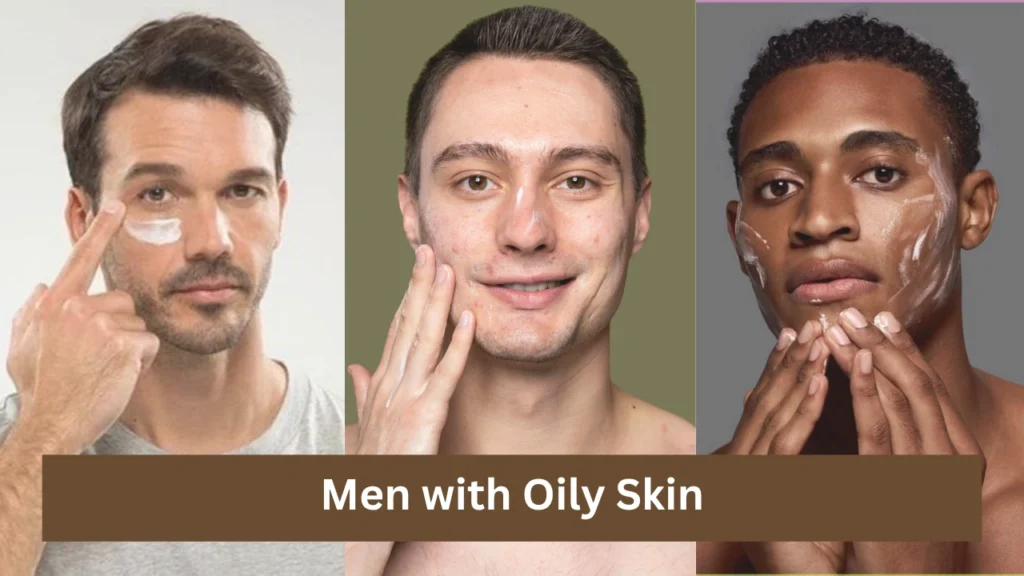


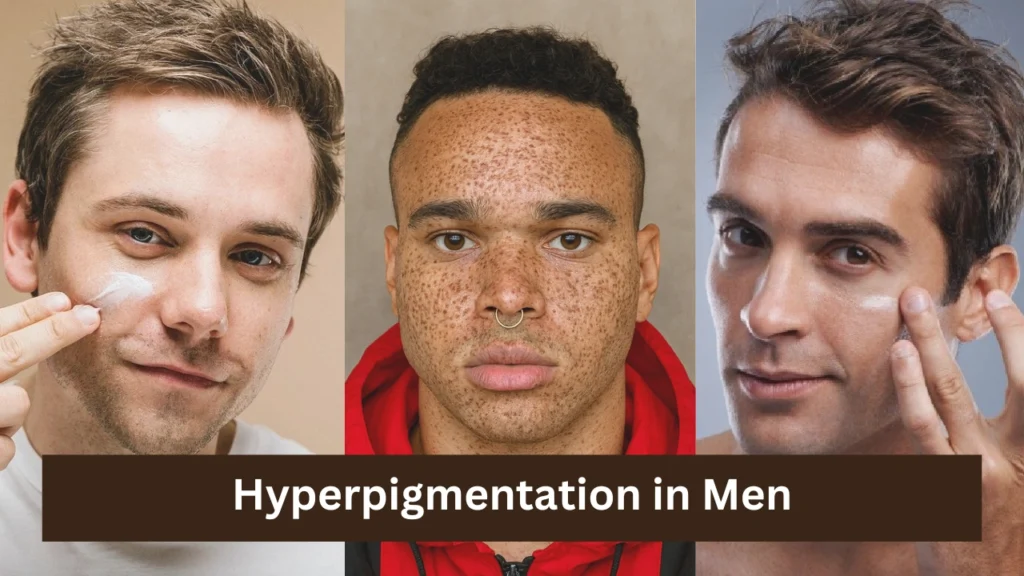




Pingback: 5 Hyperpigmentation in Men: Best Effective Home Remedies and Skincare Products.